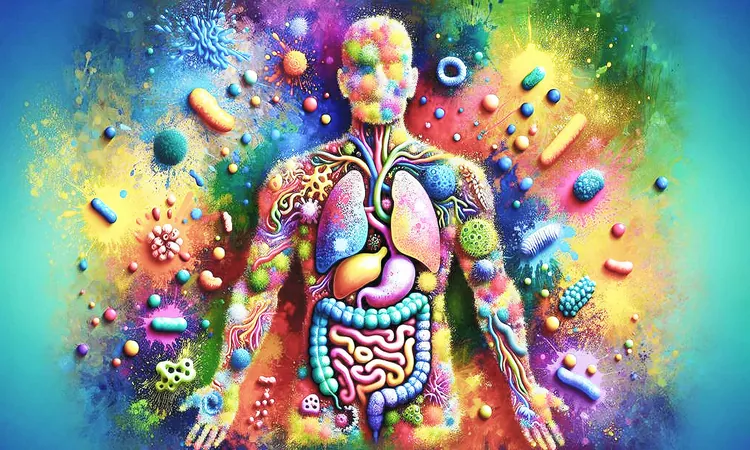
Your Unique Microbiome: The Hidden Fingerprint of Health from Head to Toe!
2025-03-31
Author: Kai
Your Unique Microbiome: The Hidden Fingerprint of Health from Head to Toe!
Did you know that trillions of bacteria inhabit your body, creating a unique microbiome akin to a fingerprint? This remarkable truth reveals just how personal our microbial makeup is and how profoundly it impacts our digestion, immunity, and overall health.
A groundbreaking study conducted over six years tracked the microbiomes of individuals aged between 29 and 75, collecting comprehensive samples from the gut, mouth, nose, and skin. Led by Michael Snyder, Ph.D., from Stanford University, along with the late George Weinstock of Jackson Laboratory, this extensive research showcases how our microbiomes evolve in response to short-term illnesses, chronic conditions, and our daily lives.
Trillions of Microbes and Individual Health
Research indicates that each human microbiome contains about 39 trillion microbes. Dr. Snyder emphasizes, “Our results underscore the idea that each of us has individualized microbiomes that are special to us.” Factors such as genetics, diet, and immune responses significantly shape these communities, resulting in vast diversity among individuals. This uniqueness is crucial for our health, as distinct bacterial profiles respond differently to internal and environmental changes.
The researchers discovered that, over the course of 5,432 biological samples and more than 118 million measurements, changes in microbiome compositions were noted during routine health check-ups and significant life events, such as vaccinations or antibiotic treatments. Notably, individuals with Type 2 diabetes were found to have less stable and less diverse microbiomes, which may link limited variety of gut bacteria to certain health issues.
Unveiling Microbial Stability and Interconnection
The study unveiled a surprising discovery: while one might assume that shared bacteria among people would be the most stable, the opposite is true. Personal microbiomes tend to be the most consistent, maintaining stability even in the face of environmental influences. This finding suggests that understanding our individual microbial baselines can enhance resilience during health challenges.
Furthermore, alterations in microbial populations in the nose, mouth, or skin were found to coincide with changes in gut bacteria, highlighting a fluid interconnection that operates like a cohesive system. Immune proteins in the blood were synchronized with these microbial shifts, illustrating a strong link between microbial balance and immune responses.
The Critical Role of the Microbiome in Health Future
The implications of these findings suggest that our microbiomes not only shape our individual health but can also help predict responses to treatments. Dr. Snyder points out that the variety and composition of our microbiomes can significantly impact our health outcomes, urging further research into personalized medical care that caters to specific microbial characteristics.
The scientific journey into understanding the microbiome began as early as the 1600s with primitive microscopes, originally focusing on harmful bacteria. Today, the importance of beneficial microbes is being recognized, reinforcing the notion that our microbial residents play vital roles beyond mere passengers.
With advancing research, we see the potential for developing personalized medical plans leveraging microbiome knowledge. Tailored probiotics and dietary strategies could strengthen our health, while monitoring microbial markers may help detect subtle changes that herald chronic conditions.
What Lies Ahead?
As exploration into the connections between gut microbes and mental health deepens, the potential benefits from understanding our microbial makeup become increasingly apparent. Researchers are now also investigating how skin microorganisms might influence skin conditions like dryness or irritation.
The advancements in genetic analysis will potentially allow for more precise mapping of our unique bacterial populations, fostering longevity in health without resorting to a universal approach. The exciting world of microbial research beckons, hinting that nurturing our personal microbiomes might soon hold the key to individualized health care.
While these microbial mysteries continue to unravel, one thing is clear: it’s time to shine a spotlight on our personal armies of bacteria as we strive for better health and personalized care. Stay tuned for more groundbreaking insights as discoveries in this field evolve!
This enlightening study, published in Cell Host & Microbe, forms a part of the groundbreaking Integrative Human Microbiome Project, further exploring the vast influence our unique microbial partners have on our health.




 Brasil (PT)
Brasil (PT)
 Canada (EN)
Canada (EN)
 Chile (ES)
Chile (ES)
 Česko (CS)
Česko (CS)
 대한민국 (KO)
대한민국 (KO)
 España (ES)
España (ES)
 France (FR)
France (FR)
 Hong Kong (EN)
Hong Kong (EN)
 Italia (IT)
Italia (IT)
 日本 (JA)
日本 (JA)
 Magyarország (HU)
Magyarország (HU)
 Norge (NO)
Norge (NO)
 Polska (PL)
Polska (PL)
 Schweiz (DE)
Schweiz (DE)
 Singapore (EN)
Singapore (EN)
 Sverige (SV)
Sverige (SV)
 Suomi (FI)
Suomi (FI)
 Türkiye (TR)
Türkiye (TR)
 الإمارات العربية المتحدة (AR)
الإمارات العربية المتحدة (AR)